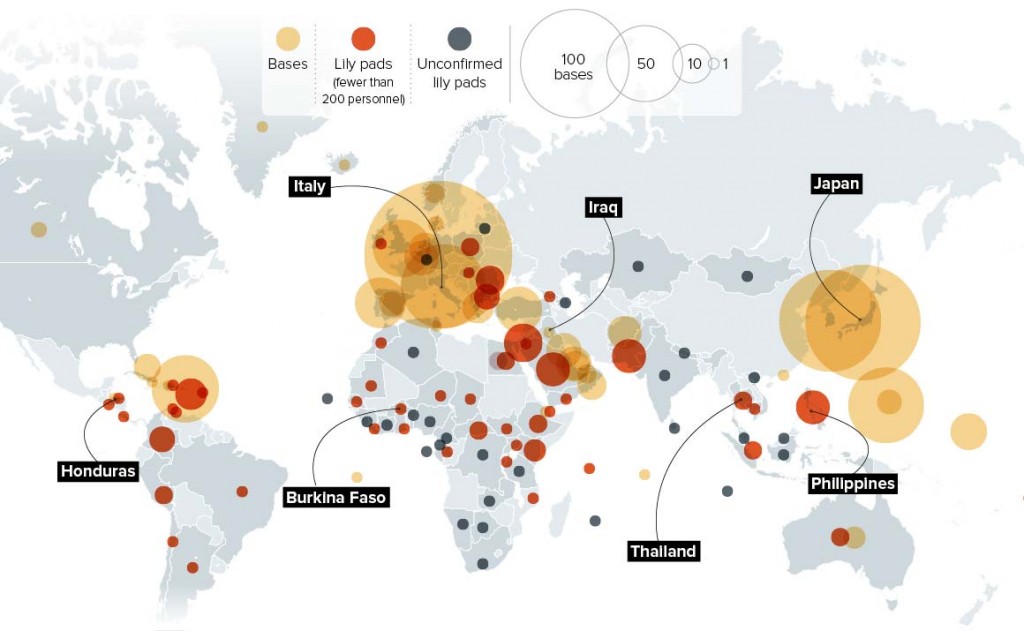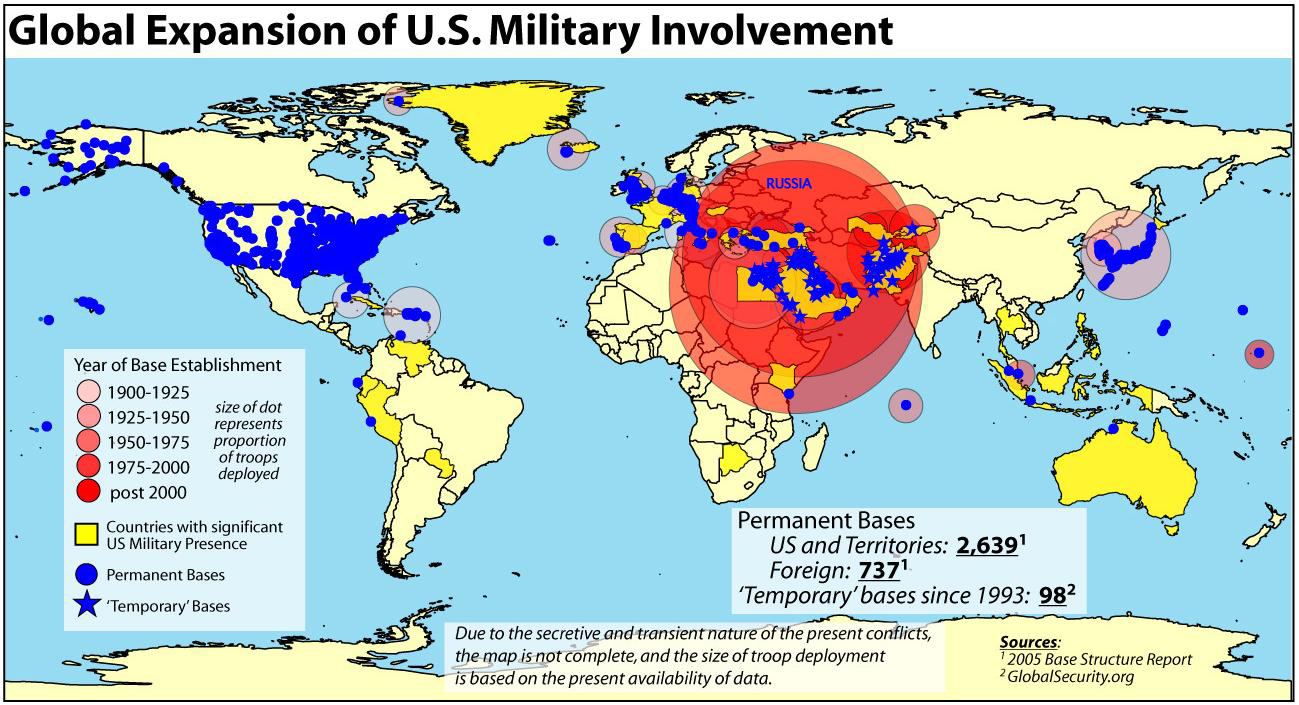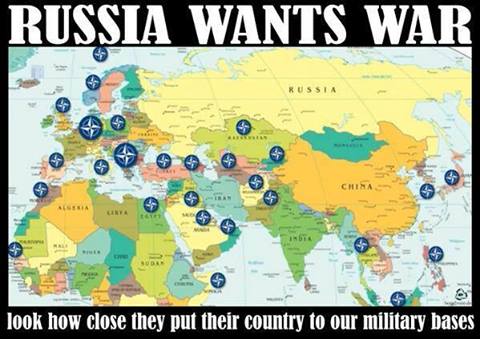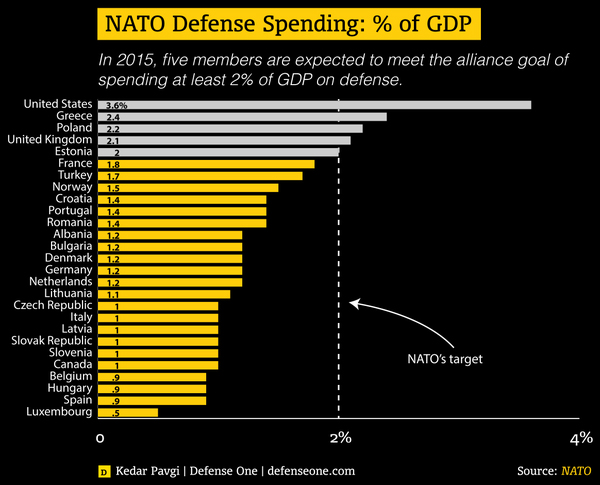What to Expect from Trump’s Military Foreign Policy
SINCE THE ELECTION OF DONALD TRUMP to be President of the United States, many think tank and intelligence agency executives have stepped forward to offer insight and make forecasts toward what a Trump presidency might bring. Among these stellar agencies, Stratfor is perhaps the foremost recognized global leader in the intelligence forecasting business. Stratfor, operating out of Austin, Texas is referred to by foreign policy experts world wide and is known for its insight and excellence in global forecasting. Unfortunately, Stratfor is increasingly off with its forecasts, as are most intelligence agencies and US State Department analysts. Although their geopolitical analysis remains strong, they are increasingly off because they are using outdated models and assumptions that interprets things through the lens of a UK-US neoliberal hegemony, which is rapidly coming to a close. The fact is, the world is in transition to something new, thereby reducing the effectiveness of old forecast models. Stratfor has simply not caught on. New ideas, movements, and energies are underway around the globe that require an entire new set of assumptions and new models of forecasting that take into account the impact of morality and religion in the economic, political and cultural affairs of nations. New Era Global Intelligence refers to this model as “Theopolitics” in contradistinction to the “Geopolitical” model used by Stratfor et al.
Geopolitics remains essential, but it is limited due to its lack of moral, religious, and cultural variables that are increasingly at play in world politics. Thus, we prefer to look at the future Trump presidency and to make forecasts based on a theopolitical model, one which includes geopolitics, but a whole lot more. This article is therefore intended to demonstrate the weakness of old geopolitical models and the strength of new theopolitical models by using forecasts of a Trump presidency as an example. Because geopolitical Stratfor forecasts are, we believe, increasingly far off and different from the theopolitical ones made by New Era, time will soon tell which forecasting model has more strength and validity for the future.
So What Can be Expected of a Trump Foreign Policy?
This topic is approached by first considering what Stratfor analysts have to say followed by a completely contrary forecast made by New Era.
First, Stratfor adopts a neoliberal position on Russia as evidenced by its reporting on supposed Russian interference in US election without any evidence that such interference ever occurred:
“Given the friendly rhetoric during the campaign season (and the indirect assistance to the Trump campaign from alleged Russian cyber attacks), Russian President Vladimir Putin is expecting to sit down for a serious negotiation with Trump.”
A close reader cannot get by the first paragraph, without questioning the objectivity at Stratfor. If there is no evidence for a cyber attack and it is admitted that the allegation is only “alleged” why is it even in the report – this shows a bias against Russia that is not backed by any evidence. Besides, I for one, would like to know just what kind of support Mr. Trump would have received by a cyber attack? Did it increase votes for him some how? If so, then it should be demonstrated just how it accomplished such an objective. The whole issue is an amorphous allegation meant to confuse and somehow befuddle readers into thinking the election was effected by Russia and therefore Trump owes Putin. Just what exactly was this alleged “indirect assistance” received by Trump?
Stratfor analysts correctly point out that although President Trump will have “… the executive authority to ease sanctions”, and although Russia “can de-escalate its military campaign in Syria” there are limits imposed on a Trump-Putin dialogue from the American side:
“The U.S. military establishment, the U.S. Intelligence Community, Republican congressmen and even potential members of Trump’s Cabinet are hawkish on Russia and realize the high strategic cost of encouraging an expansion and entrenchment of its sphere of influence in the former Soviet sphere.”
“Putin is also not going to significantly compromise Russia’s position in critical buffer states such as Ukraine. Moreover, the increasingly Putinized Russian state has coped with domestic challenges by demonizing the West and claiming a U.S. plot to dismantle Russia as a whole. If the Kremlin cannot secure big strategic concessions for its domestic audience, then it will need to keep vilifying the West to sustain nationalist support.”
Although it begins with a basic logical presumption, this prognosis is highly biased, deceptive, and highly unlikely. Although it is true that Trump will face an intelligence community and Republican statesmen that are hawkish on Russia, Sen. McCain-Arizona for example, the article does not say which “potential Trump Cabinet” members are hawkish – there is a presumption of continued hawkishness. Moreover, why would any world leader, Putin included, compromise his or her position on securing borders and national security interests along lands shared with “critical buffer states”? This is a normal political reaction to perceived threats coming form the United States and NATO, which have given President Putin more than enough reason to want to secure his buffer zone. Stratfor makes it look as though Russia under Putin is some type of military aggressor while ignoring the aggression of the United Sates and NATO on Russia’s critical borders and around the world.
What would happen if Russia fomented a coup against a democratically elected government in Mexico City and then threatened to move its troops to the Texas border? Would the United States have a compelling interest to secure its borders and complain of Russian aggression? But this is exactly what the United States did in the Ukraine, at a time that Sen. McCain boasted that the US was involved in the overthrow of legitimate governments. McCain even showed his face in Kiev at a critical moment of social unrest against a democratically elected government. Why was he even there? He certainly did not represent the interests of the reigning government but wanted it to be overthrown as another victim in a series of “spring times” he bragged about facilitating. If Russia is defending its interests on its Ukrainian border, so what? Any nation would do the same if provoked as Russia has been. Simply stated, the United States has over 2,000 military bases stationed worldwide; Russia has a handful in its own region – so who is the aggressor.
US military spending is higher than that of all the countries of the world combined. NATO alone spends ten times more on military than the entire Russian Federation – so who is the aggressor?
Putin recently challenged the West to publish a map of all of its bases around the world and compare them to Russian bases – such a map would more clearly show who the aggressor is:
Putin continued:
“American submarines are on permanent alert off the Norwegian coast; they are equipped with missiles that can reach Moscow in 17 minutes. But we dismantled all of our bases in Cuba a long time ago, even the non-strategic ones. And you would call us aggressive?”
“You yourself have mentioned NATO’s expansion to the east. As for us, we are not expanding anywhere; it is NATO infrastructure, including military infrastructure, that is moving towards our borders. Is this a manifestation of our aggression?”
“Everything we do is just a response to the threats emerging against us. Besides, what we do is limited in scope and scale, which are, however, sufficient to ensure Russia’s security. Or did someone expect Russia to disarm unilaterally?”
MAPS OF US BASES AROUND THE WORLD
Looking at the maps below, it seems that Mr. Putin has a valid point, a point that neoliberals at Stratfor want to ignore:

Graphic by 5W Infographics
Please excuse the following jocularity (sarcasm), but this is how ridiculous it has become: If we need further proof of Russia’s aggression we need only consider how bold the Russians are: How dare they move their country so close to our military bases. It is not the Russians who are demonizing the West, we do a good job of that all by ourselves; it is the West that is demonizing Russia. It seems that Russia and the West have switched roles. Hopefully, under President Elect Trump, the United States and Russia will be reconciled and cooperate to protect Christians and advance world peace – things the neoliberals and neocons fear more than anything else, consequently, Putin must be a demon.

Anyone with eyes can see who is threatening whom. Russia is virtually surrounded except for the frigid North Pole and even there the US has nuclear submarines than can target and hit Moscow in 17 minutes.

Donald Trump has indicated that NATO nations should start paying their fair share for military protection rather than letting the United States bear the burden as it has for decades. The US is just one of 28 members, but is responsible for approximately 70% of NATO spending. NATO accepted a policy (2104) that requires all members to contribute a minimum of least 2% of their gross domestic product to NATO. Only five nations out of 28 do so.

In response to Trump’s comments about NATO, European Commission President Jean-Claude Juncker, called for the creation of a European Union Army in lieu of NATO. After Donald Trump’s election as US president, Junker said the EU could no longer rely on America to assure its security and needed a “new start” by building a “European army.” The idea is being hotly opposed. It seems that many in Europe want peace with Russia, not war, a cooling, not a heating of relations and are not afraid to blame the European liberals (and their American neoliberal and neocon partners) in the West for provoking Russia and telling the truth about our military failures in “spring” revolutions fomented in Iraq, Syria, Libya and Afghanistan:
It is clear, there are going to be consequences If the EU does not do its agreed part,
“We don’t know what that consequence will be, but I think most Americans are in favor of that. They think everybody should pay their fair share. “There’s no reason why the United States of America has to put up with the nonsense of caring for the defense and the security of a country that doesn’t pick up its fair share” (Carl Paladino, Trump’s NY Campaign Chief).
It will be more cost effective for Europe to increase its support of NATO than to build an entire military system for itself, but it seems that they are getting the Trump message. In this regrard, Jens Stoltenberg, NATO Chief, delivered a strong warning following Trump’s victory.
“Going it alone is not an option.…This is no time to question the partnership between Europe and the United States.”
“In these uncertain times we need strong American leadership, and we need Europeans to shoulder their fair share of the burden….But above all we need to recognize the value of the partnership between Europe and America. It remains indispensable.”
Clearly, there is going to be an emphasis on NATO; however, it is not clear what direction Europe will take. It has behooved Eastern European nations like Poland to pay their fair share because being a beneficiary of NATO far outweighs the cost of military protection it would have to provider for itself otherwise. Nonetheless, as Europe continues to unravel, as other nations threaten to follow Britain’s exit and the crisis with imposed liberalism continues, NATO will have to take these concerns into account if it intends to remain a viable entity. If the United States and Russia join hands to fight international terrorism, as Trump has indicated, it would not be surprising to see Russia become a member of a renewed NATO and a guarantor of world peace. Regarding the current international system, Trump reminds us that:
“I was establishment. Now I’m probably as anti-establishment as God ever created… The economy is rigged, the banks are rigged the whole deal is rigged, folks… It’s a bad system and it’s a dangerous system because people are angry as hell about what’s going on.”
Because Trump sees the current system as “rigged” and “dangerous” there are sure to be changes. As far as the military is concerned, a more likely forecast envisions Trump progressively removing gender confused senior officers placed by President Obama and restoring manliness to the military. This in itself will reduce concerns about homophobic Christian Russia coming from the neoliberal military brass and their civilian employers. In the past, they wanted to contain Russia because of Communism; today they want to contain Russia because of the “contagion” of Christianity.
Analysts at Stratfor are aware of American military presence around the globe; the problem is that they seem to be either neocon or neoliberal ideologues who prefer fiction to truth, esp. when the fiction appears to be true as it has for decades. The tide is turning. Stratfor reports that the Russian government claims that the US is engaged in a “plot to dismantle Russia as a whole.” Given American and NATO aggression and the demonization of Russian culture by Western media, the Russian claim does not seem unfounded.
Stratfor goes on to claim that countries such as Poland are vulnerable to Russian influences and must therefore “band together” to resist them. This is an old and faded dream by Stratfor founder George Friedman, known as the “Intermarium” The Intermarium, George’s cherished vision for a future Europe, is a short-cited perspective that forecasts a soon to be unity of Slavic nations from the Baltic to Black Seas who align with the West against Russia. An Intermarium will most likely occur, but not along the lines predicted by Friedman – there will be no Intermarium as George Friedman envisions it.
New Era nonetheless, does forecast an Intermarium of sorts; it will consist of Slavic nations from the Baltic to the Black Sea united with each other by their common European and Christian patrimony and united with Russia, which has officially declared itself to be Christian, against the liberalism foisted on them all be the West.
Next years elections in Germany and France will significantly impact EU relations with Russia. If pro-Russia leaders are elected in France or Germany, the European Union will reconsider it relations with Russia. Christian political parties have already gained power in Hungary, Poland, and Slovakia, and Marie Le Pen is the Catholic front runner in France. She has already indicated her desire for positive-constructive relations with Russia. If she should win, Western Europe will move, along with Eastern Europe into a military, economic, and quasi-cultural alignment with Russia rooted in the common Christian patrimony of East and West.
New Era forecasts that the United States, under Donald Trump, will move in a similar direction: Peace with Russia and a reduction of US military involvement abroad after the threat of ISIS, Daesh and Al Qaeda is eradicated by a combined and cooperating force of US-European-Russian military units.
Please watch this forecast – it is already in motion.